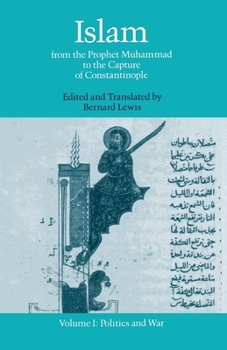Islam: From the Prophet Muhammad to the Capture of Constantinople Volume 1: Politics and War
Select Format
Select Condition 
Book Overview
This documentary history of Islam from the advent of the prophet Muhammed to the capture of Constantinople by Sultan Mehmed, the Conqueror, is concerned with a period that extends from the 7th century to 1453; with a region that stretches from Western Arabia to embrace the Middle East, North Africa, and parts of Asia, tropical Africa, and southern and eastern Europe; and with people and states, which, amid many diversities, share a common acceptance...
Format:Paperback
Language:English
ISBN:0195050878
ISBN13:9780195050875
Release Date:June 1987
Publisher:Oxford University Press
Length:304 Pages
Weight:0.78 lbs.
Dimensions:0.8" x 5.5" x 8.5"
Customer Reviews
2 ratings
What early Muslims said about themselves
Published by Thriftbooks.com User , 17 years ago
This old reader -- published in 1974 as volume two of a set; volume one on history and battles, is out of print -- gains in interest with each passing explosion. Muslim apologists detest Bernard Lewis (see the review of this volume by "A reader" for confirmation). Among the traditionalists, this is understandable. But the self-described moderates and modernizers dislike him just as much, not realizing what this says about the flimsiness of their modern mask. What Muslims of so many opinions hate about Lewis is that he applies critical historical and linguistic methods to their myths. This threatens to be as corrosive of some of those myths as the same method was of Christianity, monarchism and any number of other myths where western scholars have used it. Of all Lewis' books, "Islam" should be the most acceptable to them, since it consists almost entirely of translations, with very little -- insufficient, in my opinion -- commentary. Most of these ancient documents were in Arabic, with a few in Turkish and Persian and a couple in Hebrew. Lewis comments that the remains of written records from the early centuries of Islam are comparatively scanty, and what do exist have not been systematically collected and translated, unlike the huge compendiums of Greek and Latin. It is impossible not to be impressed by the energy invested in spreading the doctrines of Mohammad so far and wide in the early years. Or not to marvel at how, within less than two centuries, the theologians managed to shut down further discussion. Christianity, by contrast, was just beginning to fight its doctrinal battles when it was 200 years old. Plus, the Muslims had simultaneously to devise practical rules for government, whereas Christianity eventually just took over a functioning government and bureaucracy. Thus, the section on business is one of the longest in the book. How this was done can be traced in the first two sections on religion and on "heresy and revolt." (In strict doctrine, as Lewis notes, Islam does not allow for heresy. In practice, it does.) The remaining sections give a glimpse into how life was lived, whether in accordance with or in disregard for religion. There is travel literature; a very interesting section on Arab racism, which would appeal to any Nazi; something about relations between the sexes (almost entirely from the man's viewpoint); slavery. Nothing about art and little about literature. There are only a few scraps of poetry, which is a bit of a surprise, since poetry is regarded by the Arabs as their supreme art, and it was also highly respected by Turks and Persians. The last section is perhaps the most interesting. It includes selections from Arab and Persian joke books. These amount (sometimes) to a wry commentary on the doctrines exposed in the earlier sections. Reading them is rather like studying Russian jokes in the Communist era to learn what the masses really thought. Among the insights I found in these extracts: Female geni
Well measured and critical response
Published by Thriftbooks.com User , 21 years ago
This is not Bernard Lewis's best work, but it still retains the unbiased, scholarly yet readable style of his previous efforts. He is unflinching - which upsets many zealots - in his analysis and lacking in apologist platitudes, but without honesty, there can be no literature. I hope he continues to document Middle Eastern history uneffected by political and religous fundamentalism. The literature of history needs him.






